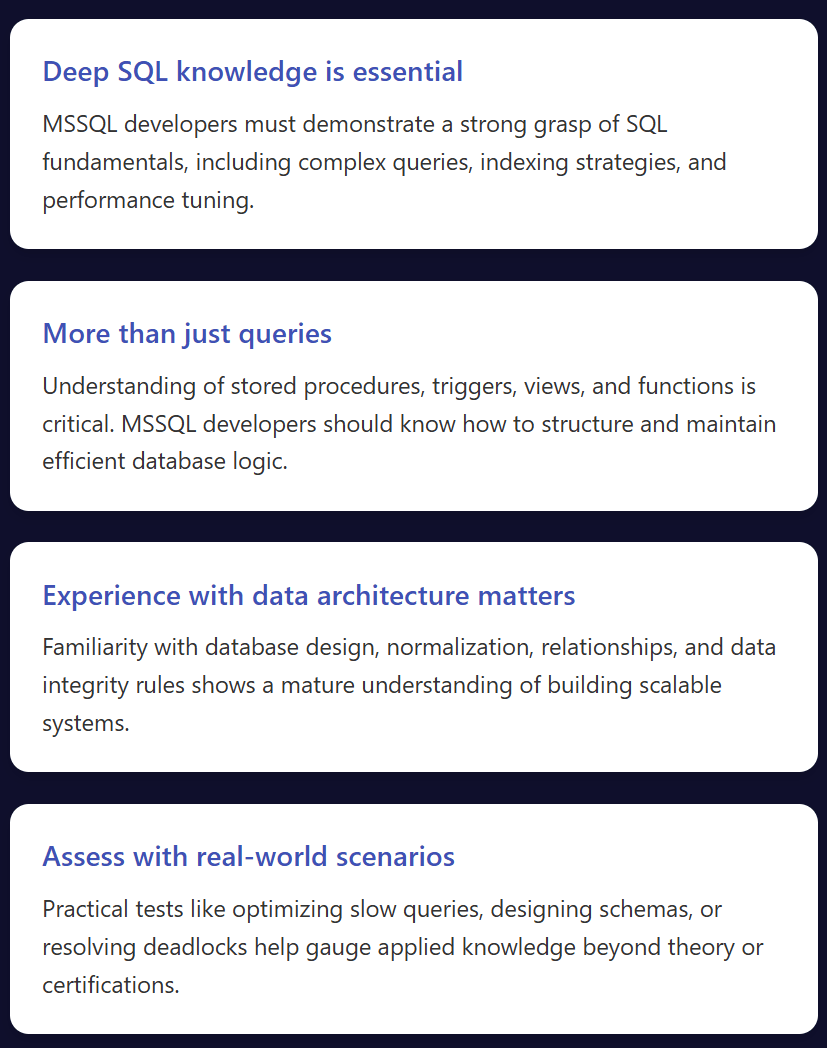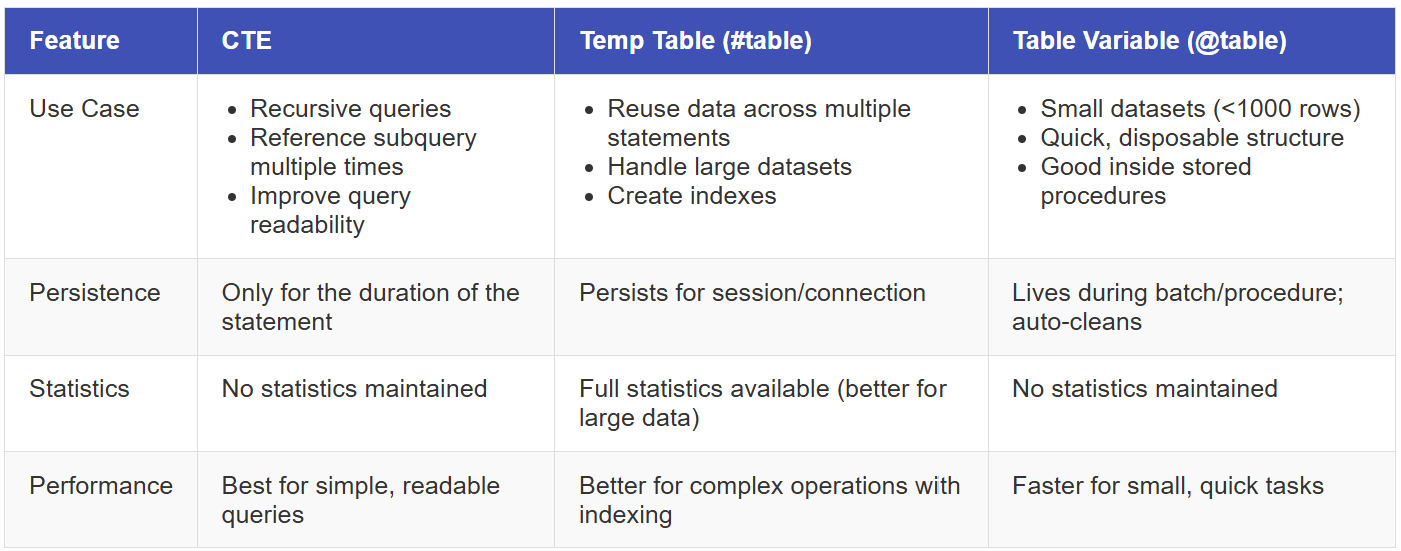NEW
Proxify is bringing transparency to tech team performance based on research conducted at Stanford. An industry first, built for engineering leaders.
Learn more
So, what does hiring the right way mean? It means not rushing the process, taking the time to assess skills, experience, and cultural fit. Since hiring the wrong candidate can lead to inefficiencies and increased costs, it’s essential to find the best MSSQL experts available.
Finding the right MSSQL developer involves more than just reviewing resumes and conducting interviews. To ensure success, let’s explore the key aspects to consider before and during the hiring process.
About Microsoft SQL Server (MSSQL)
Microsoft SQL Server (MSSQL) is a relational database management system (RDBMS) developed by Microsoft. It is widely used for storing, retrieving, and managing structured data in enterprise applications.
Key features of MSSQL
- High performance & scalability: Handles large datasets efficiently with advanced indexing and query optimization.
- Security & compliance: It offers robust security features like Transparent Data Encryption (TDE), Row-Level Security (RLS), and Always Encrypted.
- Integration with Microsoft ecosystem: Seamlessly works with .NET, Azure, Power BI, and SQL Server Reporting Services (SSRS).
- Business Intelligence (BI) capabilities: Supports SQL Server Analysis Services (SSAS) and SQL Server Integration Services (SSIS) for data warehousing and ETL processes.
- High availability & disaster recovery: Features like Always On Availability Groups, Failover Clustering, and Log Shipping ensure minimal downtime.
Why and when should you hire an MSSQL Developer?
MSSQL remains one of the most widely used enterprise database systems. Hiring an MSSQL developer ensures your database infrastructure is optimized, secure, and scalable. Here’s when and why you should consider hiring one:
When to hire an MSSQL Developer
- You need to design, optimize, or migrate an MSSQL database.
- Your business relies on data analytics, reporting, or business intelligence.
- You require high availability, replication, or disaster recovery solutions.
- Your applications use .NET, Azure, or other Microsoft technologies that integrate with MSSQL.
- You need to improve query performance or troubleshoot slow database operations.
Why hire an MSSQL developer?
A skilled MSSQL developer can add significant value across multiple areas of your database operations, including:
- Expert database design & optimization: Ensures efficient schema design, indexing, and query tuning.
- Enhanced security & compliance: Implements best practices for data protection and regulatory compliance.
- Seamless integration with applications: Works with backend systems, APIs, and cloud services.
- Cost savings & performance gains: Reduces server costs by optimizing resource usage.
- Business intelligence & reporting: Enables advanced data analytics for decision-making.
Useful stats about MSSQL
Microsoft SQL Server remains one of the dominant database management systems in the market.
Microsoft SQL Server maintains a strong position in the database market with a substantial 27.56% market share, making it a market leader in the database category. Its cloud counterpart, Azure SQL, holds a respectable 7.66% market share, showing the growing importance of cloud-based solutions in Microsoft's database strategy. Meanwhile, Microsoft SQL Server Analysis Service (SSAS), which provides OLAP and data mining capabilities, accounts for 1.18% of the database market.
The financial compensation for SQL Server professionals is competitive, with the average annual salary for employees at SQL Server estimated at approximately $91,398. Most professionals earn between $80,529 and $103,112 annually, though individual compensation varies based on role, experience, location, and specialized skills.
What does an MSSQL developer do?
An MSSQL developer specializes in database development, administration, and optimization. Their responsibilities include:
- Database design & schema optimization: Creating efficient table structures, relationships, and indexing strategies.
- Writing & optimizing SQL queries: Developing stored procedures, functions, triggers, and views for performance.
- Data migration & ETL processes: Moving data between systems using SSIS, BCP, or Azure Data Factory.
- Performance tuning & troubleshooting: Identifying and resolving slow queries, deadlocks, and bottlenecks.
- Security & compliance management: Implementing TDE, RLS, and auditing to protect sensitive data.
- Backup & disaster recovery planning: Setting up automated backups, replication, and failover strategies.
- Integration with applications: Connecting MSSQL with .NET, Java, Python, or cloud services.
What should recruiters consider before they hire MSSQL Developers?
These are the crucial aspects that recruiters should keep in mind:

- Solid SQL fundamentals are non-negotiable: MSSQL developers must demonstrate a solid understanding of SQL essentials. This includes writing complex queries, using joins strategically, and knowing how to apply indexing and performance tuning. The ability to analyze execution plans and troubleshoot bottlenecks carries more weight than memorizing syntax.
- Think beyond basic SQL commands: Great MSSQL developers go deeper than just SELECT, INSERT, or UPDATE. They know how to use stored procedures, views, functions, and triggers to structure backend logic that’s efficient, secure, and easy to maintain.
- Architectural thinking adds value: Candidates who understand relational design, normalization principles, and data modeling bring long-term benefits. Whether it's defining clear relationships or enforcing data integrity, architectural knowledge helps build scalable and reliable databases.
- Evaluate with applied, practical tasks: Hands-on assessments tell you more than a résumé ever could. Give candidates real-world challenges like optimizing slow queries or resolving blocking issues. Their approach to these tasks reveals their performance in your production environment.
Technical skills of an MSSQL Developer
- Advanced T-SQL knowledge: Expertise in writing complex queries, stored procedures, and dynamic SQL.
- Database design & normalization: Understanding 3NF, indexing strategies, and partitioning.
- Performance tuning: Experience with execution plans, query optimization, and SQL Profiler.
- SQL Server tools: Proficiency in tools such as SSMS, SSRS, and Azure Data Studio
- Cloud & hybrid deployments: Knowledge of Azure SQL Database, Managed Instances, and AWS RDS for SQL Server.
- High availability solutions: Experience with Always On, Log Shipping, and Database Mirroring.
Non-technical skills of an MSSQL Developer
Apart from coding and technical skills, non-technical skills make developers even better candidates than they already are with their technical knowledge.
Let’s group a few notable traits into a larger group of communication skills. Here, the recruiters and hiring managers can pay attention to English language proficiency, listening, and responding. Alongside this line of thought, openness and a communicative attitude are also great traits to look for: positivity, curiosity, knowledge, and keenness in conversation.
Then there are the company culture factors, too. Does the developer seem like they would fit well in the company culture? Is the developer a good cultural fit overall?
Of course, the dev should use good quality equipment (headset and camera) and be in a neatly organized room/premise with good lighting and no noise. Even though these aspects are considered a default, to begin with, they are pretty underestimated when it comes to evaluating professionalism.
Essentials and assessment of an MSSQL Developer
When hiring an MSSQL (Microsoft SQL Server) developer, focus on the following key aspects to ensure they possess the necessary database expertise:
Core competencies:
- Strong T-SQL proficiency: Deep understanding of Transact-SQL (T-SQL) for writing complex queries, stored procedures, functions, and triggers.
- Database design & optimization: Expertise in schema design, normalization, indexing strategies, and query performance tuning.
- SQL Server management: Hands-on experience with SQL Server installation, configuration, maintenance, and troubleshooting.
- Data integration & ETL: Knowledge of SQL Server Integration Services (SSIS) for data extraction, transformation, and loading processes.
Database development & administration:
- Stored procedures & functions: Ability to write efficient, reusable, and secure database logic.
- Indexing & query optimization: Skills in analyzing execution plans, identifying bottlenecks, and optimizing SQL queries.
- Partitioning & scalability: Experience with table partitioning, sharding, and scaling databases for high-performance applications.
- Backup & recovery: Knowledge of backup strategies, point-in-time recovery, and disaster recovery planning.
Security & compliance:
- Role-Based Access Control (RBAC): Implementing security through schemas, roles, and permissions.
- Data encryption: Familiarity with TDE (Transparent Data Encryption), column-level encryption, and secure data handling.
- Auditing & compliance: Setting up SQL Server Audit to track database activities and ensure compliance.
Integration & advanced features:
- SQL Server Reporting Services (SSRS): Creating and delivering reports for business intelligence.
- Azure SQL & cloud migration: Knowledge of Azure SQL Database, managed instances, and hybrid cloud setups.
Assessment considerations:
- Technical skills test: Assign a task involving complex query writing, stored procedure development, or performance tuning.
- Database design review: Check how well they design schemas and improve existing structures.
- Problem-solving & debugging: Check how they solve deadlocks, query timeouts, and concurrency problems.
- Collaboration & documentation: Communicates well with developers, analysts, and stakeholders and maintains clear documentation.
A skilled MSSQL developer designs strong databases, optimizes queries, secures data, and connects with other Microsoft tools to build reliable and scalable solutions.
Interview questions to test the technical skills of an MSSQL Developer
To evaluate a candidate’s expertise, ask these key questions:
1. When would you use a clustered index and when a non-clustered index?
Expected answer:
A clustered index determines the physical order of data in a table (only one per table), while a non-clustered index is a separate structure that points to the data rows.
Use a clustered index for columns frequently used in range queries or sorting. Use non-clustered indexes for fast lookups on columns that are not part of the clustered key.
2. How would you troubleshoot a slow-running query?
Expected answer:
Candidates' answers should contain one of these strategies:
- Check the execution plan for scans, lookups, and missing indexes.
- Look at statistics, indexes, and parameter sniffing.
- Use SET STATISTICS IO/TIME ON for resource usage.
- Analyze wait stats and resource bottlenecks.
- Consider rewriting the query or applying hints as a last resort.
3. How do you detect and resolve deadlocks in SQL Server?
Expected answer:
Deadlocks can be dealt with by following these steps:
- Use SQL Server Profiler, Extended Events, or Deadlock Graphs to detect.
- Analyze the victim/culprit process and resource contention.
- Fix this by adjusting the transaction order, breaking large transactions, indexing them appropriately, or using WITH (NOLOCK) carefully.
- Also consider SET DEADLOCK_PRIORITY.
4. What are TempDB best practices?
Expected answer:
TempDB can be kept efficient by following these best practices:
- Place on fast storage (SSD/NVMe).
- Configure multiple data files (usually 1 per 4 logical cores, up to 8 or more) to reduce contention.
- Set initial sizes to avoid autogrowth.
- Monitor for object spills and excessive version store usage.
5. How do you ensure a SQL Server environment is secure?
Expected answer:
By following some of the best security practices around databases:
- Use least privilege access control (roles, schemas).
- Enable TDE or cell-level encryption.
- Enable audit logs, especially for privileged actions.
- Disable SQL Server features not in use.
- Keep SQL Server patched and monitor for threats via tools like Defender for SQL or third-party solutions.
6. What is your approach to performance tuning an entire SQL Server instance?
Expected answer:
Performance tuning depends on the particular database and its structure, but there are a few general best practices that ensure the database is running optimally:
- Start with wait statistics and identify major bottlenecks (CPU, IO, locking).
- Analyze index usage and fragmentation.
- Review query plans and identify top resource-consuming queries.
- Monitor memory grants, tempdb usage, parallelism, and blocked processes.
- Regular health checks using tools like sp_Blitz, Query Store, or custom monitoring scripts.
7. When would you use a CTE vs. a temp table vs. a table variable?
Expected answer:

8. What are execution plans, and how do you use them?
Expected answer:
Execution plans show how SQL Server processes a query. There are two types of execution plans:
Estimated: Generated without running the query Actual: Generated after execution (more accurate) While analyzing execution plans, we can check the following things:
- Table scans (look for missing indexes)
- Key lookups (consider covering indexes)
- Sort/warning icons (memory issues)
- Join types (look for inefficient joins)
The following query can be used to see the execution plan:
SET SHOWPLAN_TEXT ON -- for text plan
SET STATISTICS PROFILE ON -- for actual execution plan9. Can you explain database normalization and the first three normal forms?
Expected answer:
Normalization organizes data to minimize redundancy and prevent anomalies. The three main forms are:
First Normal Form (1NF): Ensures each table has a primary key and atomic values in each column - no repeating groups or arrays. For example, instead of storing multiple phone numbers in one field, we'd create separate rows.
Second Normal Form (2NF): Builds on 1NF by removing partial dependencies - all non-key fields must depend on the entire primary key. This often means splitting tables when attributes only relate to part of a composite key.
Third Normal Form (3NF): Removes transitive dependencies - non-key fields shouldn't depend on other non-key fields. For instance, we'd separate customer address details that depend on ZIP code rather than directly on customer ID.
The main benefits are data integrity, reduced storage needs, and easier maintenance. However, we sometimes intentionally denormalize for read performance in reporting systems, carefully weighing the tradeoffs.
10. Write a query to get customer data with a specific requirement.
Expected answer:
You have a simple database with two tables: customers (customer_id, name, signup_date) orders (order_id, customer_id, order_date, amount)
Task:
Write a SQL query to find customers who:
- Signed up in 2023
- Have placed at least 2 orders
- Have spent more than $100 in total
For these customers, show:
- Customer name
- Signup date
- Total number of orders
- Total amount spent
Order the results by total amount spent (highest first).
Expected result:
SELECT c.name, c.signup_date, COUNT(o.order_id) AS total_orders, SUM(o.amount) AS total_spent
FROM
customers c
JOIN
orders o ON c.customer_id = o.customer_id
WHERE
YEAR(c.signup_date) = 2023
GROUP BY
c.customer_id, c.name, c.signup_date
HAVING
COUNT(o.order_id) >= 2 AND SUM(o.amount) > 100
ORDER BY
total_spent DESC;The above query tests the candidate on their basic SQL query writing abilities.
What distinguishes a great MSSQL Developer from a good one?
An MSSQL expert stands out by efficiently solving complex database challenges, optimizing queries for performance, and demonstrating a deep understanding of SQL Server’s capabilities.
One clear indicator of an expert is their mastery of key MSSQL and database concepts, such as:
- SQL Server architecture: A Good MSSQL developer understands core components. But the exceptional ones leverage this knowledge strategically, knowing when to trust the optimizer versus when to override it, and designing systems that maximize SQL Server's capabilities.
- Performance optimization: While good candidates fix slow queries, top performers optimize entire systems. They implement proactive monitoring, analyze workload patterns, and solve systemic bottlenecks before they impact production.
- Database design: Competent developers create normalized schemas. The best ones intentionally denormalize for performance, implement smart partitioning, and design for future scale from day one.
- T-SQL development: Good candidates write functional code. Exceptional ones craft elegant, high-performance solutions using advanced features like window functions while avoiding costly anti-patterns.
- Security implementation: Good candidates apply standard permissions. Top candidates implement row-level security and encryption without compromising performance.
- High availability: Good candidates set up highly available solutions. Exceptional ones are architects matching business continuity requirements, understanding the tradeoffs between technologies.
- Leadership: While good developers complete tasks, the best elevate entire teams through mentoring, documentation, and advocating for database excellence.
Additionally, a standout MS SQL developer typically has years of hands-on experience with large-scale databases and has worked on high-impact projects. However, expertise goes beyond just technical skills.
A truly exceptional SQL developer has a problem-solving mindset—they don’t just write queries but ensure they are scalable, maintainable, and performant. They proactively suggest schema improvements, indexing strategies, and query refactoring rather than just following instructions.
In high-pressure situations, a great MS SQL developer knows how to diagnose bottlenecks, resolve deadlocks, and optimize long-running queries while maintaining data integrity. Ultimately, the best candidates are not just skilled in SQL syntax but are strategic thinkers who enhance database performance, security, and reliability.
Business drivers and the value of MSSQL
Microsoft SQL Server (MSSQL) is a robust, enterprise-grade relational database management system (RDBMS) designed for high-performance data storage, retrieval, and analytics. It provides businesses with a secure, scalable, and highly available data platform, enabling seamless integration with modern applications, cloud services, and business intelligence tools. Organizations looking to optimize their data infrastructure should consider hiring skilled MSSQL database developers and administrators to ensure efficient database design, performance tuning, and secure data management, especially when building mission-critical business solutions.
Benefits of using Microsoft SQL Server
- Seamless Microsoft integration: Works with .NET, Azure, Power BI & Dynamics 365 for faster development.
- Lower costs: Cloud (Azure SQL) & on-prem options with optimized licensing.
- Enterprise security & compliance: Encryption, masking, and GDPR/HIPAA support.
- High-speed performance: Real-time analytics & transactions for agile operations.
- Scalability: Handles growing data needs without slowdowns.
- AI & advanced analytics: Built-in Python/R for predictive insights.
- Minimal downtime: Always On failover & automated backups for reliability.
- Cloud & hybrid flexibility: Future-proof deployments with Azure SQL.
Microsoft SQL Server is not just a database—it’s a strategic asset that drives operational efficiency, security, scalability, and innovation. Companies leveraging MSSQL benefit from:
- Faster decision-making with real-time analytics.
- Lower operational costs through optimized performance and cloud flexibility.
- Reduced risk with enterprise-grade security and compliance.
- Future-ready infrastructure that supports AI, hybrid cloud, and digital transformation.
For businesses looking to maximize their data investments, MSSQL provides a reliable, scalable, and intelligent platform that aligns with both current needs and long-term growth strategies.
By adopting MSSQL, organizations gain a competitive edge, ensuring their data infrastructure supports agility, security, and innovation in an increasingly data-driven world.
Possible challenges when you hire MSSQL developers
Setbacks and challenges are part of hiring, but planning helps you overcome them.
First, it’s possible that the hired candidate won’t be the ideal pick for the role. Managers sometimes hire less-qualified candidates to save costs and simplify the hiring process.
Another challenge that could occur is the competitors' and developers' rates in general. If you can't meet a candidate's salary expectations, competitors may hire the best talent instead.
Remember, there might also be a limited pool of the best candidates you’re looking for. If you (ideally) strive to hire the best of the best, there’s a high likelihood that the group of devs in the top tier is scarce. With this, the recruitment process might take longer, and more resources might be needed to complete the hiring process.
Conclusion
Hiring the right MSSQL developer will ensure that your databases are secure, high-performing, and scalable. Focusing on technical skills, problem-solving ability, and experience with modern databases can help you find the best talent for your organization.
Hiring the right MSSQL developer ensures your database systems are secure, high-performing, and scalable. Focusing on technical skills, problem-solving ability, and experience with modern database technologies can help you find the best talent for your organization.
Whether you need a database architect, SQL developer, or administrator, a well-planned hiring strategy will help you build a robust data infrastructure that supports your business growth.
Ready to hire an MSSQL developer? Start by defining your requirements, rigorously assessing candidates, and choosing the best fit for your team!













